- SorteringsrekkefølgeStandard
Bildetittel, A → Å
Bildetittel, Å → A
Dato opprettet, nyeste → eldste
✔ Dato opprettet, eldste → nyeste
Dato publisert, nyeste → eldste
Dato lagt ut, eldste → nyeste
Vurdering, høy → lav
Rangering, lav → høy
Besøk, høy → lav
Besøk, lav → høy - SpråkAfrikaans Argentina AzÉrbaycanca
á¥áá áá£áá Äesky Ãslenska
áá¶áá¶ááááá à¤à¥à¤à¤à¤£à¥ বাà¦à¦²à¦¾
தமிழ௠à²à²¨à³à²¨à²¡ ภาษาà¹à¸à¸¢
ä¸æ (ç¹é«) ä¸æ (é¦æ¸¯) Bahasa Indonesia
Brasil Brezhoneg CatalÃ
ç®ä½ä¸æ Dansk Deutsch
Dhivehi English English
English Español Esperanto
Estonian Finnish Français
Français Gaeilge Galego
Hrvatski Italiano Îλληνικά
íêµì´ LatvieÅ¡u Lëtzebuergesch
Lietuviu Magyar Malay
Nederlands Norwegian nynorsk Norwegian
Polski Português RomânÄ
Slovenšcina Slovensky Srpski
Svenska Türkçe Tiếng Viá»t
Ù¾Ø§Ø±Ø³Û æ¥æ¬èª ÐÑлгаÑÑки
ÐакедонÑки Ðонгол Ð ÑÑÑкий
СÑпÑки УкÑаÑнÑÑка ×¢×ר×ת
اÙعربÙØ© اÙعربÙØ©
Hjem / Albumer / Denver RTD 65
Innleggsdato / 2016

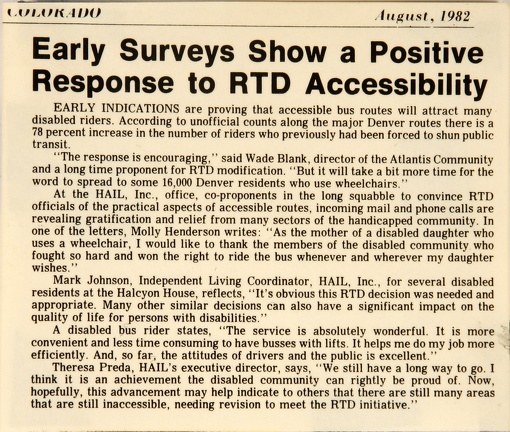 ADAPT (107)
ADAPT (107)
August 1982 Early Surveys Show a Positive Response to RTD Accessibility EARLY INDICATIONS are proving that accessible bus routes will attract many disabled riders. According to unofficial count along the major Denver routes there is a 78 percent increase in the number of riders who previously has been forced to shun public transit. “The response is encouraging,” said Wade Blank, director of the Atlantis Community and a longtime proponent for RTD modification. “But it will take a bit more time for the word to spread to some 16,000 Denver residents who use wheelchairs.” At the HAIL, Inc. office, co-proponents in the long squabble to convince RTD officials of the practical aspects of accessible routes, incoming mail and phone calls are revealing gratification and relief from many sectors of the handicapped community. In one of the letters, Molly Henderson writes: “As the mother of a disabled daughter who uses a wheelchair, I would like to thank the members of the disabled community who fought so hard and won the right to ride the bus whenever and wherever my daughter wishes.” Mark Johnson, Independent Living Coordinator, HAIL, Inc., for several disabled residents at the Halcyon House, reflects, “It’s obvious this RTD decision was need and appropriate. Many other similar decisions can also have a significant impact on the quality of life for persons with disabilities.” A disabled bus rider states, “The service is absolutely wonderful. It is more convenient a less time consuming to have busses with lifts. It helps me do my job more efficiently. And, so far, the attitude of drivers and the public is excellent.” Theresa Preda, HAIL’s executive director, says, “We still have a long way to go. I think it is an achievement the disabled community can rightly be proud of. Now, hopefully, this advancement may help indicate to others that there are still many areas that are still inaccessible, needing revision to meet the RTD initiative.”![ADAPT (108) (2004 besøk) Denver Post (approximately 12/4/81)
[Headline] Bus Life Decision Delayed
By: George Lane
Denver... ADAPT (108)](_data/i/upload/2016/05/10/20160510142110-3b8cd7ce-sm.jpg) ADAPT (108)
ADAPT (108)
Denver Post (approximately 12/4/81) [Headline] Bus Life Decision Delayed By: George Lane Denver Post Urban Affairs Writer Local transit officials, noting that there were barely enough of them to make a quorum Tuesday delayed for two weeks any decision about whether to alter plans not to put wheelchair lifts on 89 new buses. It was suggested during a special Regional Transportation District board meeting that the board order wheelchair lifts on 45 of the 89 high capacity, articulated buses, rather than no lifts at all. Board member Norma Anderson told fellow directors that there was no reason for postponing the issue “when everyone on this board knows the outcome of the vote.”. She said following the meeting there aren’t enough votes on the board to reverse the earlier action, and the buses ultimately will be ordered without the wheelchair lifts. The announced reason for postponing the vote was that only 12 of the 20 board members attended the special meeting, and only 11 were left when the compromise proposal was presented. It takes a minimum of 11 votes for the RTD board to conduct any business. Postponing the action for two weeks could mean that RTD may have to pay some kind of penalty for not informing the bus manufacturer of the lift decision before the extended deadline of Dec. 10. But the board’s action delayed for at least two weeks another possible wheelchair-bound –sit-in following an RTD board meeting last month. About two dozen persons from the Atlantis Community for the disabled staged a 2 1/2 hour sit-in following an RTD board meeting last month. They claimed the board’s decision then not to order the lifts was a “breach of promise” subjecting handicapped bus passengers to second-class ridership. After the RTD officials agreed to hold a special board meeting to reconsider the decision against the lifts, the wheelchair-bound sit-in ended peacefully. It had been feared police force would have to be used to end it. Eighteen handicapped persons and supporters and representatives of disabled people spoke during Tuesday’s special board meeting. RTD officials again attempted to convince the disabled congregation that not putting the lifts on the articulated buses will free other buses with lifts and result in better service to handicapped people.![ADAPT (109) (4467 besøk) The Denver Post Friday, Dec. 18, 1981
[Headline] Handicapped Will Protest RTD Wheelc... ADAPT (109)](_data/i/upload/2016/05/10/20160510142135-e4044ea4-sm.jpg) ADAPT (109)
ADAPT (109)
The Denver Post Friday, Dec. 18, 1981 [Headline] Handicapped Will Protest RTD Wheelchair-Lift Ban By George Lane Denver Urban Affairs Writer The board of directors of the Regional Transportation District Thursday made it official – there will be no wheelchair lifts on 89 high-capacity buses expected to be delivered in 1983. The board actually decided a month ago there would be no lifts on the new buses, but they have been hedging on finalizing that action because of objections voiced by the area’s disabled community. Following the vote on the lifts, Wade Blank, co-administrator for the Atlantis Community for the disabled and organizer of the protest against the RTD action, told the transit directors that members of the handicapped community view the action as a violation of their human rights and they will respond to that violation Jan. 4. Blank later said members of the disabled community will be in “training for civil disobedience” between now and Jan. 4. He said beginning Jan. 4, 10 disabled persons in wheelchairs will stage a sit-in in the office of L.A. “Kim” Kimball, RTD’s executive director and general manager. “Everyday during the month of January, 10 disabled people will be occupying Kimball’s office,” Blank said. They won’t have any able-bodied people with them – and if they’re arrested they will be replaced by 10 more. At the conclusion of the board meeting, Kimball told the directors that the RTD staff will take steps to try to prevent this action, but he doesn’t think it proper to discuss those steps at this time. The RTD board during its Nov. 19 meeting voted to save more than a million dollars by not ordering the lifts on the new buses. The RTD staff recommended this action because they said the lifts are expensive (more than $12,000 per bus) and difficult to maintain. The staff proposal was to use the articulated buses on high ridership bus routes, freeing regular buses with wheelchair lifts to provide better service for the handicapped. A delegation from the handicapped community objected to this proposal, with arguments that RTD officials had promised several years ago that 50 percent of the district’s bus fleet would be made accessible to wheelchair-bound riders and all new buses would be ordered with lifts. About 25 disabled persons from Atlantis staged a wheelchair-bound sit-in following the November meeting until Kimball and three board members promised to attempt to get the entire board to reconsider the action. Thursday’s vote was the outcome of that promise.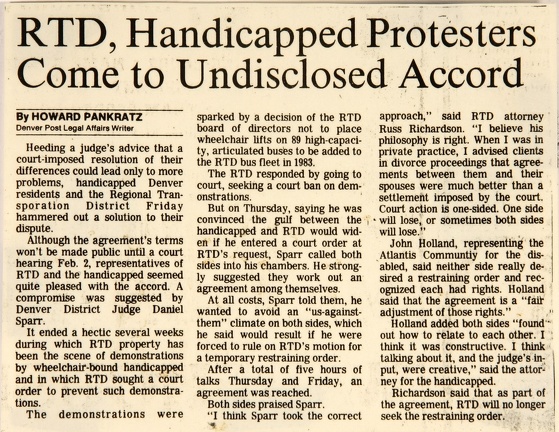 ADAPT (110)
ADAPT (110)
Denver Post RTD, Handicapped Protesters Come to Undisclosed Accord By: Howard Pankratz, Denver Post Legal Affairs Writer Heeding a judge’s advice that a court-imposed resolution of their differences could lead only to more problems, handicapped Denver residents and the Regional Transportation District Friday hammered out a solution to their dispute. Although the agreement’s terms won’t be made public until a court hearing February 2, representatives of RTD and the handicapped seemed quite pleased with the accord. A compromise was suggested by Denver District Judge Daniel Sparr. It ended a hectic several weeks during which RTD property has been the scene of demonstrations by wheelchair-bound handicapped and in which RTD sought a court order to prevent such demonstrations. The demonstrations were sparked by a decision of the RTD board of directors not to place wheelchair lifts on 89 high-capacity, articulated buses to be added to the RTD bus fleet in 1993. The RTD responded by going to court, seeking a court ban on demonstrations. But on Thursday, saying he was convinced the gulf between the handicapped and RTD would widen if he entered a court order at RTD request, Sparr called both sides into his chambers. He strongly suggested they work out an agreement among themselves. At all costs, Sparr told them, he wanted to avoid an “us-against-them” climate on both sides, which he said would result if he were forced to rule on RTD's motion for a temporary restraining order. After a total of five hours of talks Thursday and Friday, an agreement was reached. Both sides praised Sparr. “I think Sparr took the correct approach,” said RTD attorney Russ Richardson. “I believe his philosophy is right. When I was in private practice, I advised clients in divorce proceedings that agreements between them and their spouses were much better than a settlement imposed by the court. Court action is one-sided. One side will lose, or sometimes both sides will lose.” John Holland, representing the Atlantis Community for the disabled, said neither side really desired a restraining order and recognized each had rights. Holland said that the agreement is a “fair adjustment of those rights.” Holland added both sides “found out how to relate to each other. I think talking about it, and the judge’s input, were creative,” said the attorney for the handicapped. Richardson said that as part of the agreement, RTD will no longer seek the restraining order.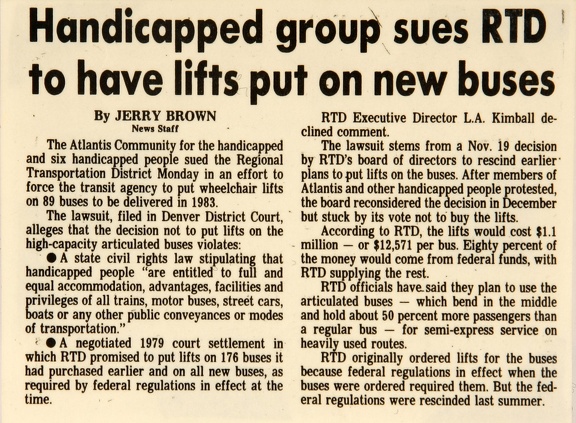 ADAPT (111)
ADAPT (111)
Handicapped group sues RTD to have lifts put on new buses By Jerry Brown, News Staff The Atlantis Community for the handicapped and six handicapped people sued the Regional Transportation District Monday in an effort to force the transit agency to put wheelchair lifts on 89 buses to be delivered in 1983. The lawsuit, filed in Denver District Court, alleges that the decision not to put lifts on the high-capacity articulated buses violates: * A state civil rights law stipulating that handicapped people “are entitled to full and equal accommodation, advantages, facilities and privileges of all trains, motor buses, street cars, boats or any other public conveyances or modes of transportation.” * A negotiated 1979 court settlement in which RTD promised to put lifts on 176 buses it had purchased earlier and on all new buses, as required by federal regulations in effect at the time. RTD Executive Director L.A. Kimball declined comment. The lawsuit stems from a Nov. 19 decision by RTD’s board of directors to rescind earlier plans to put lifts on the buses. After members of Atlantis and other handicapped people protested, the board reconsidered the decision in December but stuck by its vote not to buy the lifts. According to RTD, the lifts would cost $1.1 million – or $ 12,571 per bus. Eighty percent of the money would come from federal funds, with RTD supplying the rest. RTD officials have said they plan to use the articulated buses – which bend in the middle and hold about 50 percent more passengers than a regular bus – for semi-express service on heavily used routes. RTD originally ordered lifts for the buses because federal regulations in effect when the buses were ordered required them. But the federal regulations were rescinded last summer.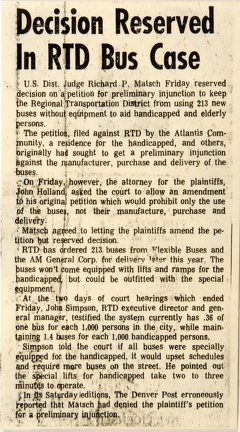 ADAPT (112)
ADAPT (112)
The Denver Post? Decision Reserved In RTD Bus Case U.S. Dist. Judge Richard P. Matsch Friday reserved decision on a petition for preliminary injunction to keep the Regional Transportation District from using 213 new buses without equipment to aid handicapped and elderly persons. The petition, filed against RTD by the Atlantis Community, a residence for the handicapped, and others, originally had sought to get a preliminary injunction against the manufacture, purchase and delivery of the buses. On Friday, however, the attorney for the plaintiffs, John Holland asked the court to allow an amendment to his original petition which would prohibit only the use of the buses, not their manufacture, purchase and delivery. Matsch agreed to letting the plaintiffs amend the petition but reserved decision. RTD has ordered 213 buses from Flexible Buses and the AM General Corp. for delivery later this year. The buses won’t come equipped with and ramps for the handicapped, but could be outfitted with the special equipment. At the two days of court hearings which ended Friday, John Simpson, RTD executive director and general manager, testified the system currently has 36 of one bus for each 1,000 persons in the city, while maintaining 1.4 buses for each 1,000 handicapped persons. Simpson told the court if all buses were specially equipped for the handicapped, it would upset schedules and require more buses on the street. He pointed out the special lifts for handicapped take two to three minutes to operate. In its Saturday editions, The Denver Post erroneously reported that Matsch had denied the plaintiff’s petition for a preliminary injunction.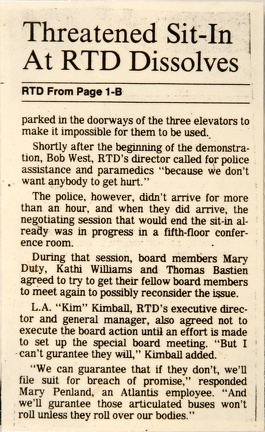 ADAPT (113)
ADAPT (113)
This is a continuation of the story in ADAPT 99 and the entire article is included there for easier reading.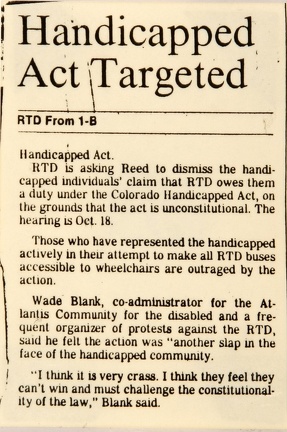 ADAPT (114)
ADAPT (114)
This is a continuation of the article in ADAPT 105 and the entire story is included there for easier reading.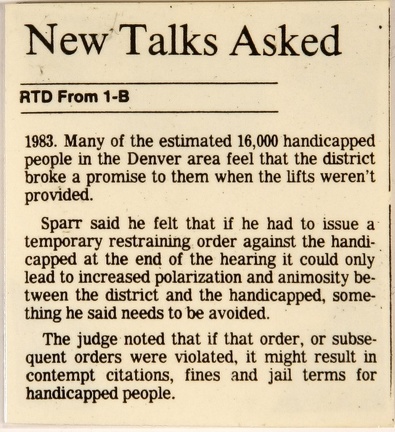 ADAPT (115)
ADAPT (115)
This article is a continuation of the story in ADAPT 116 and the text is included there for easier reading. ADAPT (116)
ADAPT (116)
Denver Post (This article continues in ADAPT 115 but the entire text is included here for easier reading.) "Talk,” Judge Tells RTD, Atlantis By Howard Pankratz Denver Post Legal Affairs Writer Citing what he fears to be increased “polarization” between some of the Denver’s handicapped citizens and the Regional Transportation District, a Denver judge Thursday abruptly halted a hearing involved the two parties, called them into his chambers and asked that they negotiate a settlement to their dispute. The unusual action by Denver District Judge Daniel Sparr came in the midst of a hearing on RTD’s request that Sparr ban some handicapped people from engaging in disruptive demonstrations on RTD property and buses. At all cost, said the judge, he wanted to avoid an “us against them” climate. “It appears it is a confrontation that is not going to do anybody any good,” he said. On January 4, 5 and 6, handicapped individuals, some organized by the Atlantis Community for the disabled, demonstrated at various RTD offices protesting a decision by the RTD Board of Directors not to place wheelchair lifts on 89 high-capacity, articulated buses slated to be added to the RTD bus fleet in 1983. Many of the estimated 16,000 handicapped people in the Denver area feel that the district broke a promise to them when the lifts weren’t provided. Sparr said he felt that if he had to issue a temporary restraining order against the handicapped at the end of the hearing it could only lead to increased polarization and animosity between the district and the handicapped, something he said needs to be avoided. The judge noted that if that order, or subsequent orders were violated, it might result in contempt citations, fines and jail terms for handicapped people. ADAPT (117)
ADAPT (117)
Handicapped reach accord RTD Wheelchair-bound demonstrators and the Regional Transportation District reached an “understanding” Friday in a conflict that led the bus company to seek a restraining order against the demonstrators a week ago. Both sides “agreed to agree,” according to RTD spokeswoman Kathy Joyce, who said they would work out the details of the agreement before the issue comes before Denver District Judge Daniel Sparr on Feb. 2 During that time, Sparr will make no decision on RTD’s request for the temporary restraining order. If a formal agreement is reached by Feb. 2, Joyce said the request would be dropped. The demonstrators began staging a sit-in at RTD’s headquarters Jan. 4 over the company’s decision not to place wheelchair lifts on 89 new buses scheduled for delivery next year. The wheelchair-bound activists were from the Atlantis Community and Holistic Approaches to Independent Living Inc. Several of the demonstrators chained themselves to stairwells in the main lobby of the building at 1600 Blake St., and others blocked the front entrance during the demonstration. Their anger was directed at RTD Executive Director L.A. Kimball, whom they blame for the decision to omit the lifts from the new buses. During the sit-in, the building’s elevators were shut off, making it impossible for the demonstrators to reach Kimball’s office. The demonstrators weren’t arrested, but they were escorted from the premises by police and paramedics. RTD requested the temporary restraining order against the demonstrators after the third day of protest, claiming the demonstration caused “disruption, obstruction and interference.” John Holland, an attorney representing the demonstrators, said the issues that led to the demonstrations are still alive, but that both sides will work out their differences in the next two and a half weeks in a climate of more open communication. He said that during that tie his clients will not be “disruptive.”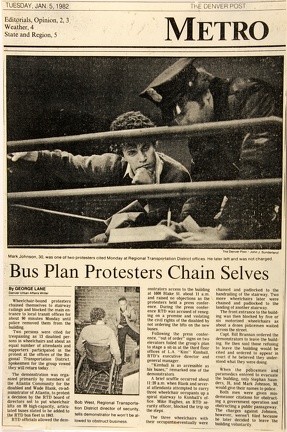 ADAPT (118)
ADAPT (118)
The Denver Post, Metro section, Tuesday Jan. 5, 1982 2 PHOTOS, The Denver Post / John J Sunderland: First: Through bars that look a bit like the ropes in a boxing ring, a man in a wheelchair (Mark Johnson) sits, chin resting on his hand, and looks on thoughtfully as a police officer writes something on a piece of paper on a surface in front of them. The officer is leaning forward almost over Mark, and Mark looks calm and very thoughtful as he watches. Caption reads: Mark Johnson, 30, was one of two protesters cited Monday at Regional Transportation District offices. He later left and was not charged. Second photo: In a brick covered room, a person in a wheelchair has his back to the camera and facing a man who is blocking his way. The man standing faces the camera and points toward it. Caption reads: Bob West, Regional Transportation District director of security, tells demonstrator he won't be allowed to obstruct business. Bus Plan Protesters Chain Selves By GEORGE LANE, Denver Urban Affairs Writer Wheelchair-bound protesters chained themselves to stairway railings and blocked the main entrance to local transit offices for about 90 minutes Monday until police removed them from the building. Two persons were cited for trespassing as 13 disabled persons in wheelchairs and about an equal number of attendants and supporters participated in the protest at the offices of the Regional Transportation District. Spokesmen for the group vowed they will return today. The demonstration was organized primarily by members of the Atlantis Community for the disabled and Wade Blank, co-administrator of Atlantis, to protest a decision by the RTD board of directors not to put wheelchair lifts on 89 high-capacity, articulated buses slated to be added to the RTD bus fleet in 1983. RTD officials allowed the demonstrators access to the building at 1600 Blake St. about 11 a.m. and raised no objections as the protesters held a press conference. During the press conference RTD was accused of reneging on a promise and violating the civil rights of the disabled by not ordering the lifts on the new buses. Following the press conference, “out of order" signs on two elevators foiled the group's plan to stage a sit-in at the third floor offices of L.A. "Kim" Kimball, RTD's executive director and general manager. “Kimball is as accessible as his buses," remarked one of the demonstrators. A brief scuffle occurred about 11:20 a.m. when Blank and several attendants attempted to carry three wheelchair occupants up a spiral stairway to Kimball‘s office. Mike Hughes, an RTD security officer, blocked the trip up the steps. The three wheelchairs with their occupants eventually were chained and padlocked to the handrailing of the stairway. Two more wheelchairs later were chained and padlocked to the landing of another stairway. The front entrance to the building was then blocked by five or six motorized wheelchairs as about a dozen policemen waited across the street. Capt. Bill Brannan ordered the demonstrators to leave the building. He then said those refusing to leave the building would be cited and ordered to appear in court it he believed they understood what they were doing. When the policemen and paramedics entered to evacuate the building, only Stephan Saunders, 31, and Mark Johnson, 30, would give their names to police. Both men were given misdemeanor citations for obstructing a government operation and obstructing a public passageway. The charges against Johnson, however, weren't filed because he later decided to leave the building voluntarily.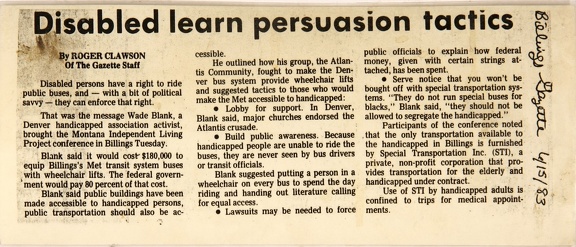 ADAPT (119)
ADAPT (119)
Billings Gazette 6/15/83 Disabled learn persuasion tactics by ROGER CLAWSON, of the Gazette Staff Disabled persons have a right to ride public buses, and — with a bit of political savvy - they can enforce that right. That was the message Wade Blank, a Denver handicapped association activist, brought the Montana Independent Living Project conference in Billings Tuesday. Blank said it would cost $180,000 to equip Billings’s Met transit system buses with wheelchair lifts. The federal government would pay 80 percent of that cost. Blank said public buildings have been made accessible to handicapped persons, public transportation should also be accessible. He outlined how his group, the Atlantis Community, fought to make the Denver bus system provide wheelchair lifts and suggested tactics to those who would make the Met accessible to handicapped: * Lobby for support. In Denver, Blank said, major churches endorsed the Atlantis crusade. * Build public awareness. Because handicapped people are unable to ride the buses, they are never seen by bus drivers or transit officials. Blank suggested putting a person in a wheelchair on every bus to spend the day riding and handing out literature calling for equal access. * Lawsuits may be needed to force public officials to explain how federal money, given with certain strings attached, has been spent. * Serve notice that you won’t be bought off with special transportation systems. “They do not run special buses for blacks,” Blank said, "they should not be allowed to segregate the handicapped.” Participants of the conference noted that the only transportation available to the handicapped in Billings is furnished by Special Transportation Inc. (STI), a private, non-profit corporation that provides transportation for the elderly and handicapped under contract. Use of STI by handicapped adults is confined to trips for medical appointments.![ADAPT (120) (1796 besøk) Rocky Mountain News
[2 articles together]
RTD won’t be bullied, Agency director asserts
C... ADAPT (120)](_data/i/upload/2016/05/10/20160510142346-b248de04-sm.jpg) ADAPT (120)
ADAPT (120)
Rocky Mountain News [2 articles together] RTD won’t be bullied, Agency director asserts Contractors target of get-tough policy By JOSEPH B. VERRENGIA Rocky Mountain News Staff Writer Regional Transportation District officials say they want to send a message that RTD can't be bullied. So they're considering whether to sue several contractors and consultants that they believe performed unsatisfactory work on the 16th Street Mall. "RTD is famous for saying, ‘Who? Me?“ RTD general manager Ed Colby said. “Those days are over. We're going to be proactive. RTD is going to be accountable to the taxpayers." RTD sources said that among the firms the agency might challenge on the $70 million mall project were Hill International Inc., management consultants for the mall complex; Johnson-Hopson & Associates, architects of the Civic Center bus station at the east end of the mall; and B.B. Andersen Construction Co., general contractor for the station. Colby terminated Hill and Johnson-Hopson last month when he said they allowed construction work at Civic Center to stop or slow repeatedly while haggling over construction changes. He also made Andersen promise to finish Civic Center, at the intersection of Broadway and Colfax Avenue, by Oct. 25. RTD officials filed suit Tuesday in Denver District Court against Weaver Construction Co. of Denver and the I.M. Pei architectural firm of New York City for their work in designing and installing the mall's granite paving. Unforeseen flaws and cracks have appeared in an “unusually high" percentage of the mall's granite paving slabs, officials say. Replacement and repair of the slabs along the 13-block mall-could cost $2 million to $8 million, they say. Colby said RTD is “evaluating potential suits against other firms but would not name the likely targets. The granite-paving suit and the consideration of other suits is the first of many steps RTD will take to erase its reputation for being inefficient and irresponsible managers of major construction projects, he said. “RTD is going to stand up for its rights," Colby said. Civic Center, which is supposed to be open for passengers by early December, is at least eight months behind schedule. Its cost overruns, RTD officials said, are still being tabulated. If it sues the companies it hired to build the mall, RTD would continue a long tortured history of litigation that has plagued [? word hard to read] the project since 16th Street was first torn up four years ago. Those suits and settlements include: * A 1983 settlement with Weaver for $2 million for more than l00 construction changes as-well as the delivery of improperly cut granite. * A $14.1 million lawsuit by Beaudoin Construction Co. of Denver for delays and cost overruns on the Market Street bus station. * A $400,000 settlement last month with B.B. Andersen that included payment of union-level wages to Civic Center construction workers, despite a regulation to that effect on all federally funded construction projects. Federal transit administrators, who have cited the mall as an example of how transit can galvanize a downtown area, said they will demand that [realistic?] building materials be used in future projects and that they and be kept within budget. “We raised questions at the outset about the wisdom of granite," said Ralph Stanley; director of the-Urban Mass Transit Administration. “We are now requiring construction oversight in all federally funded projects and an independent review by our agency of projects costing $25 million and over. You can demand a degree of excellence," Stanley said. 2nd Article: Ribbon snipped for bus station at 1 Civic Center Photo Rocky Mountain News Staff Photo by Frank Kimmel: A lone man [Joe Carle] in a manual wheelchair, back to the camera, watches as groups of people in suits cluster on an open plaza. A long ribbon crosses in front of a bus and one group surround a man who appears to be cutting the ribbon. Caption reads: Protester Joe Carle watches bus station opening. By JOSEPH B. VERRENGIA Rocky Mountain News Staff Writer When the ceremonial ribbon was snipped and the yellow sash fluttered to the pavement, the beleaguered Civic Center bus station remained standing. And more than a few Regional Transportation District officials joined in a collective sigh of relief. “There have been a number of headaches (on the project),' RTD chairman Byron Johnson said Wednesday at the station's formal opening. “But we're not worried about the headaches from this day forward. We see this as a tremendous breakthrough." Buses were supposed to be pulling out of the $20 million station, located at the intersection of Broadway and Colfax Ave., in April. But hundreds of complicated construction changes and bitter negotiations between contractors and consultants delayed its opening by six months. Last month, RTD general manager Ed Colby fired the station's architect and management consultant when parts of the concrete building had been left unfinished for 14 months and others had been ripped out and replaced as many as four times. Colby and his assistants took over management of the station themselves and demanded that the exterior be ready for Wednesday's ceremony and the arrival of President Reagan's mass transit director, Ralph Stanley. Stanley used the occasion to announce $6.5 million in federal grants to RTD and the Denver Regional Council of Governments. His brief speech was picketed by 10 handicapped demonstrators. Some of the the demonstrators were arrested in Washington last week when they disrupted a national transit convention where Stanley as a featured guest. "When you're putting on a party, nobody likes a crasher," said Wade Blank, who organized the silent vigil. We're here to make a statement." Workers were, at the site until 10:30pm Tuesday scrubbing the bus turn around out front and planting 17 trees along the Broadway facade.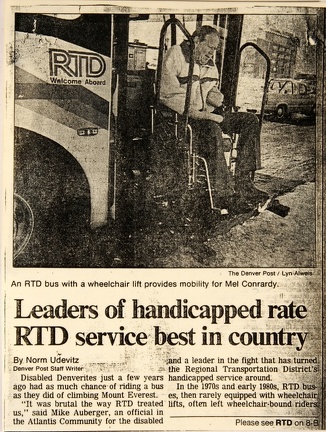 ADAPT (122)
ADAPT (122)
Denver Post [This article continues on in ADAPT 123, but the entire text is included here for easier reading.] Photo by Lyn Alweis: A short haired man in a jacket and dark slacks [Mel Conrardy] is lifted in his wheelchair from the sidewalk to a bus. The lift comes out of the front door of the bus and has railings on either side of the lift almost as tall as the seated man. Just by the bus door is a sign on the side of the bus that says "RTD Welcome Aboard." Caption: An RTD bus with wheelchair lift provides mobility for Mel Conrardy Title: Leaders of handicapped rate RTD service best in country By Norm Udevitz, Denver Post Staff Writer Disabled Denverites just a few years ago had as much chance of riding a bus as they did of climbing Mount Everest. “It was brutal the way RTD treated us,” said Mike Auberger, an official in the Atlantis Community, for the disabled and a leader in the fight that has turned the Regional Transportation District’s handicapped service around. In the 1970s and early 1980s, RTD busses then rarely equipped with wheelchair lifts, often left wheelchair-bound riders stranded on streets. Drivers, lacking training in dealing with visually or language impaired people, panicked when blind or deaf riders tried to board buses. “It used to be that even in the dead of winter, when it was below zero, those of us in wheelchairs would wait 2 or 3 hours for a bus to finally stop," Auberger recalls. “And often the lift was broken and we couldn't get on the bus anyway. And usually the drivers were rude and angry. They would tell us that we were ruining their schedules." But conditions have changed, Auberger says: “Right now, Denver has the most accessible public transit system for the handicapped — and all the public - in the country." Debbie Ellis, a state social services worker who heads the agency's Handicapped Advisory Council, agrees, saying: “It took a lot of pressure, but RTD has responded and now the bus system is doing a good job of serving the handicapped." Leaders of national programs for the disabled also agree. In fact, the President's Committee on Employment of the Handicapped will bring 5,000 delegates, many of them handicapped, to its national conference in Denver in April. This will be the first time in four decades the group has held its national session outside of Washington DC. “One of the key reasons we're meeting in Denver this year is because it just might be the most comfortable city in the country for the handicapped,” says Sharon Milcrut, head of the Colorado Coalition for Persons with Disabilities, which is hosting the conference. “A very important aspect of that comfort," she notes, “is how accessible the transit system is for the handicapped.” It didn't get that way easily. In the decade between 1974 and 1984, handicapped activists had to pressure indifferent RTD administrators and directors. Each gain was hard won. “We used every tactic in the book, from lawsuits to bus blockades on the street and sit-ins at the RTD offices," says Wade Blank, an Atlantis group director. “The lawsuits didn't help much but when we took to the streets in the late 1970s, I think that's when we started getting their attention." Blank and others also say the 1984 hiring of Ed Colby as RTD general manager helped. Before he arrived, less than half of the 750 RTD buses had wheelchair lifts, which often were in disrepair. Training for drivers to learn how to deal with handicapped riders was minimal. Agency directors resisted change. RTD relied heavily on a costly special van operation called Handyride - a door-to-door pickup service for handicapped. It has cost $13[? glare makes number hard to read] million to run since it began in 1975. “Over the past couple of years the turnaround has been phenomenal," Auberger says. “All of RTD's new buses are being ordered with lifts and older buses are being retrofitted." By 1986's end, almost 80 percent of the bus fleet — 608 of 765 buses — had wheelchair lifts; 82 percent of the fleet's 6,242 daily trips are now accessible for the disabled. Plans call for the fleet to be 100 percent lift-equipped by 1987's end. “The lifts aren't breaking down all the time now, either," Auberger said, noting that agency officials found drivers had neglected to report broken lifts: “That way the lifts stayed broken and drivers had an excuse for not picking us up. A bunch of people were fired over that and others realized that Colby wasn't kidding about improving handicapped service." Driver training also has improved dramatically. “It isn't perfect yet,” Ellis of the advisory council says. "But everyone is working hard at it. What we are finding is that 20 percent of the drivers understand that they are moving people, all kinds of people, and they're really great with the handicapped. “Another 20 percent figure their job is to move buses and to heck with passengers, all kinds of passengers. That bottom 20 percent probably won't ever change. So we're working real hard on the 60 percent in between," Ellis says. Drivers, for example, learn to help blind riders. “That’s an improvement that helps the disabled, but it also helps regular passengers who are newcomers to the city,” Ellis says. All the improvements haven't come cheap. Since 1974, more than $5million has been spent on lifts and lift maintenance, most of the expense was incurred in the last three years. RTD plans to spend $9 million more in the next six years to keep the fleet up to its current standards and pay for more driver training. Another $4 million will be spent on HandyRide service. Ironically, Auberger and Ellis both say one of the biggest problems remaining is getting more handicapped people to use mass transit. “There are no reliable figures," Ellis says. “But we think there are about 20,000 handicapped people in the metro area and only about 200 or 300 are using buses on a regular basis." Auberger, confined to a wheelchair after breaking his neck in an accident ll years ago, complains: “The medical system builds a bubble around handicapped people and makes them think they have to be protected. "That's just not true in most cases. So one of the things we're doing now is educating the handicapped to overcome their fears. We've finally got a bus system that works for us and we want the disabled to use it." Photo by Lyn Alweis: A rather straight looking man [Mel Conrardy] in a white jacket, big mittens, and a motorized wheelchair, wears a slight smile as he rides the bus. Someone in a dark jacket stands beside him, and behind him, further back on the bus, other riders are sitting on the bus seats. Caption reads: A bus seat folds up to anchor Mel Conrardy's wheelchair to the floor. Conrardy commutes to work at the Atlantis Community.